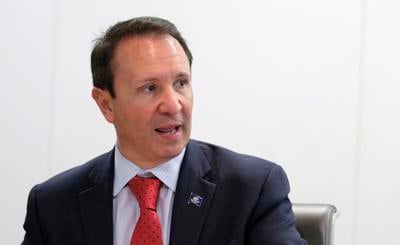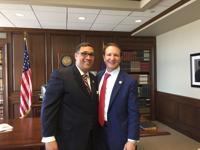The Attorney General of Louisiana has sued a reporter for requesting sexual harassment records. Nutty.
This probably violates Louisiana's anti-SLAPP law.
La. Code Civ. Proc. Ann. art. 971(A)(1) (2018).
But this Louisiana Attorney General has a lot to hide.
Reminds me of our supercilious St. Johns County School Board members and their somnambulistic $200,000 year sinecure-holder, a rather poor excuse for an "education lawyer," Frank D. Upchurch, III, who sued Jeffrey Marcus Gray in retaliation for his records requests.
From Washington Post:
‘Intimidation measure’: Louisiana AG criticized for suing reporter over records request
Jeff Landry speaks in Baton Rouge, La., in 2015. Landry has served as Louisiana's attorney general since 2016. (Melinda Deslatte/AP)
By
Hannah Knowles
Feb. 7, 2021 at 1:00 p.m. UTC
At first, Andrea Gallo’s quest for sexual harassment complaints against a top state justice official seemed like a typical public records battle. The investigative reporter heard a common refrain from agencies withholding information: There was an “ongoing investigation.”
“The records should be ready and released to you by early next week,” officials eventually told Gallo on Jan. 22, a few days after she reported the criminal division head of the Louisiana attorney general’s office had his pay docked for participating in “inappropriate” conversations.
Then the attorney general’s office came back with new arguments — and a lawsuit.
“You have demanded information which will compromise the rights of our employees and could lead to litigation over the violation of those rights,” staff for Attorney General Jeff Landry (R) wrote Friday in a letter to Gallo, a 28-year-old reporter at the Advocate and the Times-Picayune.
The letter added: “Allegations of sexual harassment that turn out to be unsupported, inaccurate and unfounded can destroy marriages, damage employee’s children, wreck families and ruin reputations.”
Libby Casey talks to investigative reporter Kimbriell Kelly and database editor Steven Rich about FOIA and open records laws. (The Washington Post)
The lawsuit against Gallo asks a judge to weigh in against disclosure and requests that the defendant pay any legal fees, alarming journalists and experts in press law who called the move a threat to government transparency and accountability. Peter Kovacs, the Advocate’s editor, said he fears a “chill” on ordinary citizens’ ability to get answers from those in power.
“If a citizen filed a public records request and then was sued and had to pay the legal fees of the agency that requested it, you would have a lot less citizens feeling comfortable filing public records requests,” he said. “It becomes an intimidation measure that promotes government secrecy.”
“It should matter to every citizen of Louisiana who might become the target of the might of their government,” he said in an interview.
The attorney general’s office did not immediately respond to requests for comment, nor did the official who was sanctioned, Patrick Magee. Magee, who has led the criminal division since 2018, does not appear to have commented publicly on the allegations against him.
The lawsuit argues that the documents Gallo seeks contain “private information that is constitutionally protected from disclosure.” In a Jan. 28 response to Gallo’s request — for sexual harassment allegations against Magee as well as records showing how they were handled — officials shared some documents but said they could not provide “the initial complaint.”
The suit also cites department policies on the confidentiality of employees’ complaints and says redactions to protect privacy “would result in a meaningless document.” It also says agencies would struggle to fight sexual harassment if staff feared their grievances will become public.
“Publication and/or disclosure of such detailed, personal accounts may embarrass or humiliate the complainant, accused, witnesses and anyone else involved,” the suit states.
Gallo was running up against a deadline Friday afternoon when an email subject line caught her eye: “Landry v. Gallo, 19th JDC, State of Louisiana.”
It was stunning, she said — “but I didn’t totally have time to process it, because I kept thinking, I’ve got to finish this LSU story.” She kept working. Her editor scrambled to cover the lawsuit.
She put in her records request in December when Magee went on administrative leave for unspecified reasons. Declining to share documents, staff with the attorney general’s office said in December and January that their need for secrecy was temporary — the investigation was not yet complete.
Then, one day in January, Gallo called the attorney general’s office and asked to speak with Magee, she said. Someone said Magee was out for lunch.
It seemed to Gallo that the investigation was over.
The attorney general’s office released a letter with its findings: Magee had participated in conversations with “sexual slang” and “unprofessional comments” about the appearance of employees, Gallo reported for the Advocate. He would lose more than $20,000 of his salary, the letter said.
“Once I got that, I was like … ‘where are my records?’ ” Gallo said.
She said she feels lucky to be part of a newsroom that can afford a lawyer, encouraged by a deluge of support online and alarmed the attorney general would push back so forcefully.
“It is concerning because asking for public records from government agencies and government officials is part of the bread and butter of the journalism that we do,” she said.
Government lawsuits over public records requests are not unheard of, and some worry they are part of a trend. Reacting Saturday to the lawsuit on Twitter, University of Georgia media law professor Jonathan Peters said he believes these kinds of suits have been on the rise in the past decade.
He pointed to other examples: a university’s suit against its student newspaper, an education department’s suit against a nonprofit that sought enrollment data.
“Government officials generally claim that these actions are initiated in good faith and that it is prudent for courts to step in immediately if an agency’s disclosure obligations are unclear,” he said. “But suing record requesters is unwise, democratically dangerous, and usually unlawful.”
Kovacs was more taken aback. He said he has never seen such a lawsuit over 40 years in the business.
The attorney general’s move seemed to many journalists like one more reason the Advocate should keep digging.
“I would assume they have something to hide,” Kovacs said. “But I always assume that of politicians.”
---
From Advocate via Editor and Publisher Magazine:




No comments:
Post a Comment